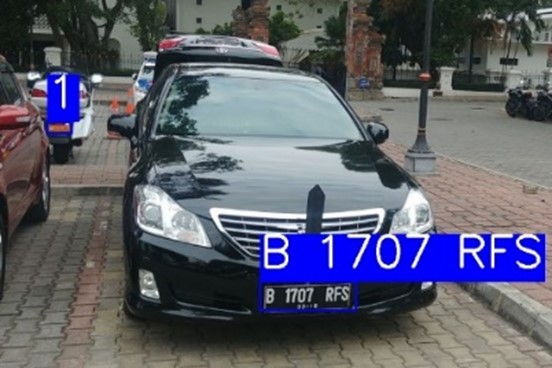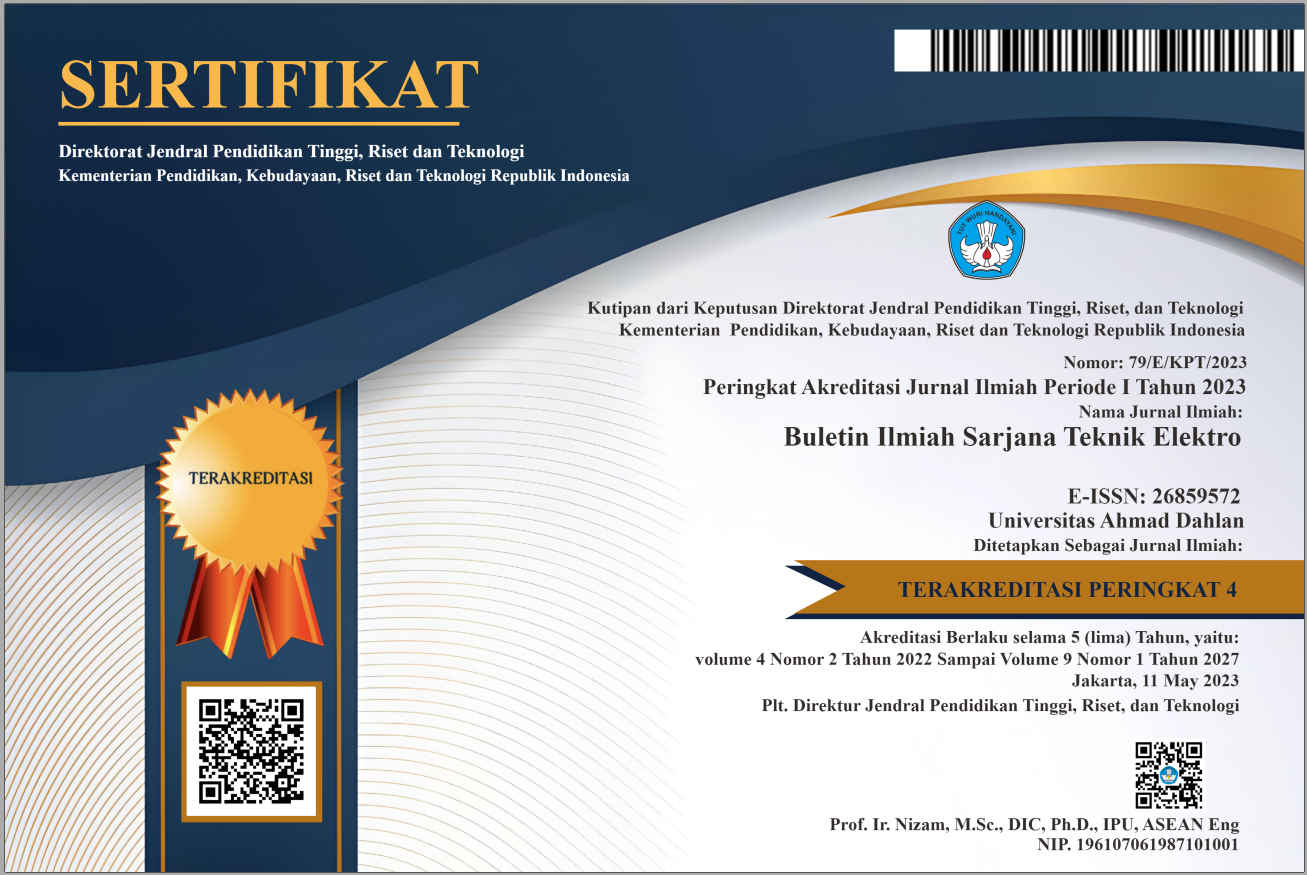Character Translation on Plate Recognition with Intelligence Approaches
DOI:
https://doi.org/10.12928/biste.v4i3.7161Keywords:
Artificial Intelligence, Characters, Precision, VehicleAbstract
In recent years, the number of automobiles in Indonesia has expanded. This rise has a knock-on impact on street crime. On this problem based, a preventative road safety prevention system is required. This research contribution is to develop an efficient algorithm for detecting vehicle license plates. This study's technique incorporates artificial intelligence technology with character translation. Yolov3 and Yolov4 are the artificial intelligence systems employed in this study. The detection of objects in the form of license plates is the result of this approach. In artificial intelligence, object detection results are utilized as input for image processing. The image processing method is used to translate characters. Optical Character Recognition (OCR) is used to decode the characters in the image precisely. The artificial intelligence data training resulted in a 76.53% and 89.55% mean average precision (mAP) level. Using OCR, the system is capable of character translation. These results give an opportunity to develop more complex image-processing applications.
References
U. Chaudhary, A. Patel, A. Patel, and M. Soni, “Survey Paper on Automatic Vehicle Accident Detection and Rescue System,” In Data Science and Intelligent Applications, pp. 319–324, 2021, https://doi.org/10.1007/978-981-15-4474-3_35.
P. Wróblewski, W. Drożdż, W. Lewicki, and J. Dowejko, “Total Cost of Ownership and Its Potential Consequences for the Development of the Hydrogen Fuel Cell Powered Vehicle Market in Poland,” Energies, vol. 14, no. 8, p. 2131, Apr. 2021, https://doi.org/10.3390/en14082131.
E. Abdul Kadir, S. Listia Rosa, A. Syukur, M. Othman, and H. Daud, “Forest fire spreading and carbon concentration identification in tropical region Indonesia,” Alexandria Eng. J., vol. 61, no. 2, pp. 1551–1561, Feb. 2022, https://doi.org/10.1016/j.aej.2021.06.064.
F. A. Arsy, “Demand Forecasting of Toyota Avanza Cars in Indonesia: Grey Systems Approach,” Int. J. Grey Syst., vol. 1, no. 1, pp. 38–47, Jul. 2021, https://doi.org/10.52812/ijgs.24.
M. F. N. Maghfiroh, A. H. Pandyaswargo, and H. Onoda, “Current Readiness Status of Electric Vehicles in Indonesia: Multistakeholder Perceptions,” Sustainability, vol. 13, no. 23, p. 13177, Nov. 2021, https://doi.org/10.3390/su132313177.
L. Peng, F. Liu, M. Zhou, M. Li, Q. Zhang, and D. L. Mauzerall, “Alternative-energy-vehicles deployment delivers climate, air quality, and health co-benefits when coupled with decarbonizing power generation in China,” One Earth, vol. 4, no. 8, pp. 1127–1140, Aug. 2021, https://doi.org/10.1016/j.oneear.2021.07.007.
M. Adhikari, A. Munusamy, A. Hazra, V. G. Menon, V. Anavangot, and D. Puthal, “Security in Edge-Centric Intelligent Internet of Vehicles: Issues and Remedies,” IEEE Consumer Electronics Magazine, vol. 11, no. 6, pp. 24–31, Nov. 2022, https://doi.org/10.1109/MCE.2021.3116415.
D. Collazos, E. García, D. Mejía, D. Ortega, and S. Tobón, “Hot spots policing in a high-crime environment: an experimental evaluation in Medellín,” Journal of Experimental Criminology, vol. 17, no. 3, pp. 473–506, Sep. 2021, https://doi.org/10.1007/s11292-019-09390-1.
K. Lejda, A. Jaworski, M. Mądziel, K. Balawender, A. Ustrzycki, and D. Savostin-Kosiak, “Assessment of Petrol and Natural Gas Vehicle Carbon Oxides Emissions in the Laboratory and On-Road Tests,” Energies, vol. 14, no. 6, p. 1631, Mar. 2021, https://doi.org/10.3390/en14061631.
D. K. Dewangan and S. P. Sahu, “RCNet: road classification convolutional neural networks for intelligent vehicle system,” Intelligent Service Robotics, vol. 14, no. 2, pp. 199–214, Apr. 2021, https://doi.org/10.1007/s11370-020-00343-6.
S. Srivastava, S. Narayan, and S. Mittal, “A survey of deep learning techniques for vehicle detection from UAV images,” Journal of Systems Architecture, vol. 117, p. 102152, Aug. 2021, https://doi.org/10.1016/j.sysarc.2021.102152.
A. Ammar, A. Koubaa, M. Ahmed, A. Saad, and B. Benjdira, “Vehicle Detection from Aerial Images Using Deep Learning: A Comparative Study,” Electronics, vol. 10, no. 7, p. 820, Mar. 2021, https://doi.org/10.3390/electronics10070820.
H. I. K. Fathurrahman, A. Ma’arif, and L.-Y. Chin, “The Development of Real-Time Mobile Garbage Detection Using Deep Learning,” Jurnal Ilmiah Teknik Elektro Komputer dan Informatika (JITEKI), vol. 7, no. 3, p. 472, Jan. 2022, https://doi.org/10.26555/jiteki.v7i3.22295.
W.-L. Mao, W.-C. Chen, H. I. K. Fathurrahman, and Y.-H. Lin, “Deep learning networks for real-time regional domestic waste detection,” Journal of Cleaner Production, vol. 344, p. 131096, Apr. 2022, https://doi.org/10.1016/j.jclepro.2022.131096.
M. A. Khan, M. Mittal, L. M. Goyal, and S. Roy, “A deep survey on supervised learning based human detection and activity classification methods,” Multimedia Tools and Applications, vol. 80, no. 18, pp. 27867–27923, Jul. 2021, https://doi.org/10.1007/s11042-021-10811-5.
A. Saxena, D. K. Gupta, and S. Singh, “An Animal Detection and Collision Avoidance System Using Deep Learning,” In Advances in Communication and Computational Technology, pp. 1069–1084, 2021, https://doi.org/10.1007/978-981-15-5341-7_81.
J. Liu and X. Wang, “Plant diseases and pests detection based on deep learning: a review,” Plant Methods, vol. 17, no. 1, p. 22, Dec. 2021, https://doi.org/10.1186/s13007-021-00722-9.
I. Ihsan, E. W. Hidayat, and A. Rahmatulloh, “Identification of Bacterial Leaf Blight and Brown Spot Disease In Rice Plants With Image Processing Approach,” Jurnal Ilmiah Teknik Elektro Komputer dan Informatika (JITEKI), vol. 5, no. 2, p. 59, Feb. 2020, https://doi.org/10.26555/jiteki.v5i2.14136.
W. L. Mao, H. I. K. Fathurrahman, Y. Lee, and T. W. Chang, “EEG dataset classification using CNN method,” in Journal of physics: conference series, 2020, vol. 1456, no. 1, p. 12017, https://doi.org/10.1088/1742-6596/1456/1/012017.
A. Bouguettaya, H. Zarzour, A. Kechida, and A. M. Taberkit, “Vehicle Detection From UAV Imagery With Deep Learning: A Review,” IEEE Trans. Neural Networks Learn. Syst., vol. 33, no. 11, pp. 6047–6067, Nov. 2022, https://doi.org/10.1109/TNNLS.2021.3080276.
Q. Huang, Z. Cai, and T. Lan, “A Single Neural Network for Mixed Style License Plate Detection and Recognition,” IEEE Access, vol. 9, pp. 21777–21785, 2021, https://doi.org/10.1109/ACCESS.2021.3055243.
R. Shashidhar, A. S. Manjunath, R. Santhosh Kumar, M. Roopa, and S. B. Puneeth, “Vehicle Number Plate Detection and Recognition using YOLO- V3 and OCR Method,” in 2021 IEEE International Conference on Mobile Networks and Wireless Communications (ICMNWC), Dec. 2021, pp. 1–5, https://doi.org/10.1109/ICMNWC52512.2021.9688407.
A. Ranjan, V. N. J. Behera, and M. Reza, “OCR Using Computer Vision and Machine Learning,” In Machine Learning Algorithms for Industrial Applications, 2021, pp. 83–105, https://doi.org/10.1007/978-3-030-50641-4_6.
R. Dey, R. C. Balabantaray, and S. Mohanty, “Sliding window based off-line handwritten text recognition using edit distance,” Multimed. Tools Appl., vol. 81, no. 16, pp. 22761–22788, Jul. 2022, https://doi.org/10.1007/s11042-021-10988-9.
S. Jain, R. Rathi, and R. K. Chaurasiya, “Indian Vehicle Number-Plate Recognition using Single Shot Detection and OCR,” in 2021 IEEE India Council International Subsections Conference (INDISCON), Aug. 2021, pp. 1–5, https://doi.org/10.1109/INDISCON53343.2021.9582216.
K. He, X. Zhang, S. Ren, and J. Sun, “Deep residual learning for image recognition,” in Proceedings of the IEEE Computer Society Conference on Computer Vision and Pattern Recognition (CVPR), 2016, pp. 770–778, https://doi.org/10.1109/CVPR.2016.90.
G. Huang, Z. Liu, L. Van Der Maaten, and K. Q. Weinberger, “Densely Connected Convolutional Networks, ” 2017 IEEE Conference on Computer Vision and Pattern Recognition (CVPR), 2017, pp. 2261–2269, https://doi.org/10.1109/CVPR.2017.243.
R. Girshick, J. Donahue, T. Darrell, and J. Malik, “Rich Feature Hierarchies for Accurate Object Detection and Semantic Segmentation,” 2014 IEEE Conference on Computer Vision and Pattern Recognition, 2014, pp. 580-587, https://doi.org/10.1109/CVPR.2014.81.
J. Redmon, S. Divvala, R. Girshick, and A. Farhadi, “You Only Look Once: Unified, Real-Time Object Detection,” 2016 IEEE Conference on Computer Vision and Pattern Recognition (CVPR), 2016, pp. 779-788, https://doi.org/10.1109/CVPR.2016.91.
J. Redmon and A. Farhadi, “YOLO9000: Better, Faster, Stronger,” 2017 IEEE Conference on Computer Vision and Pattern Recognition (CVPR), 2017, pp. 6517-6525, https://doi.org/10.1109/CVPR.2017.690.
J. Redmon and A. Farhadi, “YOLOv3: An Incremental Improvement,” 2018, https://doi.org/10.48550/arXiv.1804.02767.
A. Bochkovskiy, C.-Y. Wang, and H.-Y. M. Liao, “YOLOv4: Optimal Speed and Accuracy of Object Detection,” 2020, https://doi.org/10.48550/arXiv.2004.10934.

Published
How to Cite
Issue
Section
License
Copyright (c) 2023 Haris Imam Karim Fathurrahman, Chin Li-Yi

This work is licensed under a Creative Commons Attribution-ShareAlike 4.0 International License.
Authors who publish with this journal agree to the following terms:
- Authors retain copyright and grant the journal right of first publication with the work simultaneously licensed under a Creative Commons Attribution License that allows others to share the work with an acknowledgment of the work's authorship and initial publication in this journal.
- Authors are able to enter into separate, additional contractual arrangements for the non-exclusive distribution of the journal's published version of the work (e.g., post it to an institutional repository or publish it in a book), with an acknowledgment of its initial publication in this journal.
- Authors are permitted and encouraged to post their work online (e.g., in institutional repositories or on their website) prior to and during the submission process, as it can lead to productive exchanges, as well as earlier and greater citation of published work (See The Effect of Open Access).
This journal is licensed under a Creative Commons Attribution-ShareAlike 4.0 International License.


